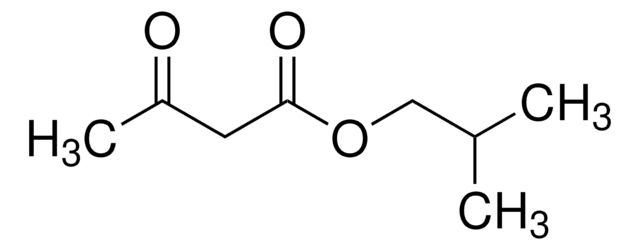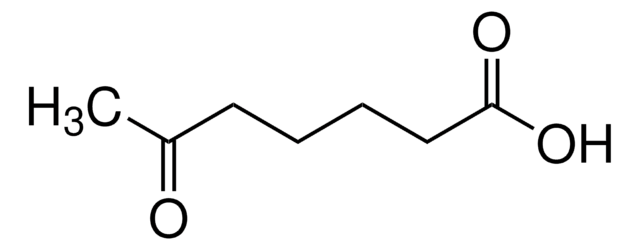W262706
Levulinic acid
≥97%, FG
Synonym(s):
4-Oxopentanoic acid, 4-Oxovaleric acid
About This Item
Recommended Products
biological source
synthetic
Quality Level
grade
FG
Fragrance grade
Halal
Kosher
Agency
follows IFRA guidelines
meets purity specifications of JECFA
reg. compliance
EU Regulation 1223/2009
EU Regulation 1334/2008 & 178/2002
FDA 21 CFR 172.515
vapor pressure
1 mmHg ( 102 °C)
Assay
≥97%
bp
245-246 °C (lit.)
mp
30-33 °C (lit.)
density
1.134 g/mL at 25 °C (lit.)
application(s)
flavors and fragrances
Documentation
see Safety & Documentation for available documents
food allergen
no known allergens
fragrance allergen
no known allergens
Organoleptic
caramel; creamy; acidic; sweet; vanilla
SMILES string
CC(=O)CCC(O)=O
InChI
1S/C5H8O3/c1-4(6)2-3-5(7)8/h2-3H2,1H3,(H,7,8)
InChI key
JOOXCMJARBKPKM-UHFFFAOYSA-N
Looking for similar products? Visit Product Comparison Guide
Signal Word
Danger
Hazard Statements
Precautionary Statements
Hazard Classifications
Acute Tox. 4 Oral - Eye Dam. 1 - Skin Sens. 1
Storage Class Code
11 - Combustible Solids
WGK
WGK 2
Flash Point(F)
208.4 °F - closed cup
Flash Point(C)
98 °C - closed cup
Personal Protective Equipment
Choose from one of the most recent versions:
Already Own This Product?
Find documentation for the products that you have recently purchased in the Document Library.
Customers Also Viewed
Our team of scientists has experience in all areas of research including Life Science, Material Science, Chemical Synthesis, Chromatography, Analytical and many others.
Contact Technical Service











